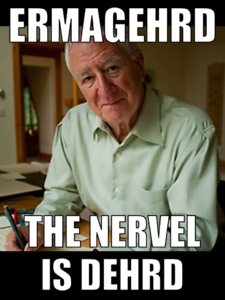 I keep coming back to this weird idea that human beings, for whom storytelling is a deeply seated instinct, have somehow killed storytelling. I keep coming back, because snoots keep coming back to it with their snooty obituaries of the novel.
I keep coming back to this weird idea that human beings, for whom storytelling is a deeply seated instinct, have somehow killed storytelling. I keep coming back, because snoots keep coming back to it with their snooty obituaries of the novel.
Yet, the novel keeps crawling out of its grave.
But, perhaps there is a kernel of truth to what the snoots are telling us. The latest investigation of literary snootery is brought to us by the Times Literary Supplement:
Any number of critics since [Bernard] Bergonzi have regurgitated the idea that the novel as we know it today persists in a kind of zombie state, stripped of whatever vital essence it once had (and this in spite of the fact that novels are being published and consumed in unprecedented numbers).
That one sentence, coupled with a working knowledge of the fiction of the undead, provides the crux of the issue. And cruxes are traditionally a good defense against another type of undead: the vampire.
See, among the undead are two extreme types. Zombies are the undead masses, swarming across the landscape and destroying everything in their path. The vampire is the undead aristocrat, the haute to the zombie hoi polloi, relatively rare and usually selecting victims carefully.
THE EXTREMES
I agree that “the fact that novels are being published and consumed in unprecedented numbers” is a sign of the literary undead. It’s driven by the crazy idea that all fiction fans could also be authors, and threatens literature with the Zombie Apocalypse depletion of targets, a pyramid scheme.
But I also see the danger of the literary haute, the life-sucking vampire elite whose existence is saturated with privileged ennui and a stultifying sense of superiority. As many cultures have arrogated for themselves the title of human, The People, or real people while disparaging their neighbors as mere tribes or races, in supremacist fashion the elite call their pet genre literary while everyone else is writing in genres.
The etymology of genre, from the Latin genus for race, even tells this story.
False existential threats are a favorite narrative of any xenophobic elite. If the real people are destroyed… well, what’s left? Those barbarian tribes! Driven by cliché and base instincts and convention. Not worth the air they breathe!
We often see this absurd threat narrative in partisan politics as well. Check your social media newsfeed for the double-edged hand-wringing. In literature, it blinds us to the vitality of fiction by serving us a false dilemma: side with the vampires or side with the zombies.
THE WAY OUT
So, how do we navigate beyond this Scylla and Charybdis? There’s a bit of ancient Chinese wisdom, which I read first in the Wen Tzu, that if you look for what’s bad in things, everything will be bad but, if you look for what’s good in things, everything will be good. There’s good and bad in everything, and that includes the undead extremes of the haute vampires and hoi polloi zombies.
The zombie hordes of “genre” fiction enjoy such massive popularity by keying into the narrative instincts of human beings. And the vampire elite of “literary” fiction occasionally deserve the acclaim they seek by elevating those instincts beyond the human. This is where the value of conservative and progressive values do their magic, the same way our ancient human ancestors mastered the bipedal gait, one foot remaining grounded while the other steps forward.
The trick to finding vital, worthwhile fiction is to reject the partisanship of literary vs. genre, because the best fiction is going to reach across the divide, and thus away from the extremes. It’s going to be found in genre fiction that isn’t afraid to aspire to literary heights, or in literary fiction that isn’t ashamed to appeal to genre sensibilities.
Storytelling is beset by zombie hordes and preyed upon by vampire parasites, but it is alive and well. The survivors need to band together, hang their traditional holy symbols around their necks against the vampires, select their favorite head-smashing weapon against the zombies, and push back the dead.
